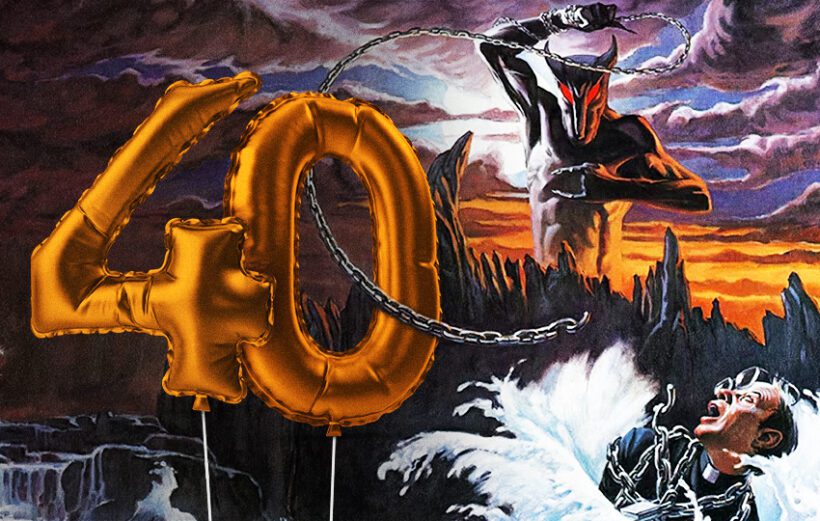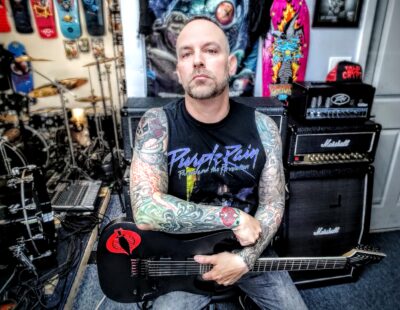
In 1983 vocalist Ronnie James Dio wasn’t long removed from his inaugural stint with Black Sabbath. With Iommi and Co., he helped reinvent a band that was losing steam and recorded two Decibel Hall of Fame-certified albums (Heaven and Hell and Mob Rules). Sabbath fell apart while making their first approved live album Live Evil (due for deluxe reissue this summer). What caused the rift depends on who tells the story. One side said Tony Iommi’s drug use had spiraled out of control. Another said Dio was acting like a dictator.
When Dio and drummer Vinny Appice asked an engineer to change parts of the recording during Iommi’s absence (bumping the vocals up in the mix), Sabbath imploded. Iommi and bassist Geezer Butler were furious, and Dio and Appice moved on. The rift lasted a decade until Dio returned for the underrated Sabbath album Dehumanizer. Fortunately, all sides reconciled in the 21st century and toured as Heaven and Hell until Dio’s passing.
Post Sabbath, Dio quickly got to work assembling a new band. Appice stayed and Dio added guitarist Vivian Campbell—barely out of his teens—and onetime Rainbow bandmate/bassist Jimmy Bain. The subsequent debut album Holy Diver is the gem in Dio’s long catalog and one of metal’s finest albums in a half-century. Holy Diver was certified platinum in 1989 en route to becoming a cornerstone in any discerning metal fan’s collection.
While both Heaven and Hell and Mob Rules bear Dio’s imprint (there is no way Butler ever pens lyrics like “Neon Knights” or “County Girl”) Holy Diver was the first time Dio had creative control in his career. As a result, Holy Diver is a Dio album through and through—a distillation of his worldview and self-help manual written via myth, fable and fantasy.
Anyone who knows Dio’s backstory knows that much of Dio’s work is unrelentingly positive despite the aesthetics. Even though the Holy Diver cover shows a mammoth demon (later christened Murray) ensnaring a priest in chains, the songs are a typical Dio pastiche of dreams and magic. The title track is about a planet-traveling savior as Dio explained in an interview: “The song is about a Christ figure who is in another place—not Earth—and who has done exactly the same there as we experienced on Earth. He died for the sins of man on that other far and distant planet so that mankind there could be cleansed, start again, and do things properly this time. The people on this planet are calling him the Holy Diver because he is about to go to another place to another planet, dive into another world, to do what he did first on our planet—save people from their sins or absolve them from their sins by having himself killed.”
In the Dio documentary Dreamers Never Die the filmmakers get into how Dio’s story isn’t a typical rock cliche; instead, it’s about chasing your passions and staking your claim in an often indifferent world and fiercely competitive music business. That worldview is apparent throughout Holy Diver, which is as much veiled autobiography as a fantasy epic. The often overlooked track “Invisible” isn’t about running from your problems—it’s about survival and endurance, something Dio knew personally. Holy Diver’s opener “Stand Up and Shout” makes it plain when Dio sings “You got the power!” Eighties parents and politicians worried about metal musicians leading teens astray but Dio was a mentor and guide that helped those kids and the generations after them make sense of a confusing world.
Musically, Holy Diver is flawless. While Dio is front and center, working his glorious voice, his new bandmates shine. Appice’s hard-hitting, bombastic style is better suited to Dio’s approach than it ever was to Black Sabbath (Bill Ward’s shadow looms large). Appice always stuck out a bit on his Sabbath recordings despite his energy and brilliance but here it’s a seamless fit. Campbell’s playing is sultry and infectious, and his solos are short but powerful. Bain matches better with Dio here than when they were in Rainbow. Dio’s Sabbath-era material was often epic—”The Sign of the Southern Cross” is almost eight minutes long—but Holy Diver is economical: The title track is over six minutes and the average song length is four minutes. It remains a breezy listen that speeds by yet contains all of Dio’s grandiloquence. Holy Diver is Dio’s vision, but his three bandmates on this album were the best messengers of the Dio gospel in Ronnie’s career.
When Holy Diver received a deluxe reissue treatment in 2022, there was some fan resentment about the remixes. Remixes are reinterpretations of a classic work meant to enhance the understanding of an album rather than supplant the original. But the anger is understandable: Holy Diver is a staple and tenet in almost every metalhead’s life. It’s the album fans feel like they own. It’s the sound of the keyboard melody on “Rainbow In the Dark” that is a lifelong earworm. It’s the work where Dio built the template he followed until his untimely passing. On Holy Diver, Dio created a place of myth and magic where listeners continue to lose themselves four decades later.







